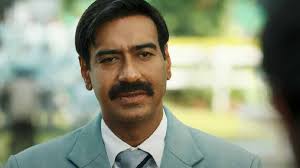Maidaan Review
Maidaan Review: Syed Abdul Rahim handpicks the best players from the streets of Secunderabad to the backwaters of Kerala in order to elevate Indian football. It resembles Nick Fury putting together the Avengers.
One can definitely sense Kolkata’s intense passion for football when they witness children playing in the rain without shoes and elderly people being just as furious at India’s 1952 Summer Olympics defeat as if their child had failed the UPSC test. Ajay Devgn’s “Maidaan,” which is set against this colorful metropolitan backdrop, narrates the compelling tale of a determined coach and a squad of underdogs who are about to make history in Indian sports.
Like many sports plays or biopics, this one from director Amit Sharma centers on the inspirational moments and stories of triumph over adversity to tell the story of the inspirational coach Syed Abdul Rahim, who took the Indian football team to new heights. Rahim is portrayed as someone who dared to take the less-traveled route, going from being viewed as a man rallying a group of underdogs to becoming known as the “Brazil of Asia” in the 1950s.
Choosing by hand the best players, he travels from the streets of Secundrabad to the backwaters of Kerala. It does sound a lot like Nick Fury putting together the Avengers. However, one could argue that India’s desire of competing in the Asian Games was equal to whatever task those superheroes undertook. Consider a nation where athletes frequently play without appropriate footwear and instead wrap fabric around their feet. To win the championship trophy, the same team must then defeat formidable opponents like Thailand, Korea, and Japan.
“Maidaan” deviates from previous sports films such as “83” and “MS Dhoni: The Untold Story” by eschewing prosthetics and intricate biographical details. Rather, it goes further into Rahim and his group’s valiant struggle against the system and the challenges they face. The players’ intense efforts to defend a goal on the field are depicted in a scene, which reflects the intensity of their battles off the field.
The film, which is based on the story of football coach Syed Abdul Rahim and India’s triumph at the 1962 Asia Games, does not, however, fully capture what makes a classic biopic. Despite the fact that actors in this genre frequently adapt mannerisms and body language, Devgn fits the part with a natural comfort. On screen, Ajay Devgn is more like himself than he is Coach Rahim. He captures a wide range, whether he’s smoking a cigarette calmly while facing criticism from the board or standing tall and defending his players in the Ministry office. Devgn maintains his celebrity appeal without letting it overpower his persona.
Syed Abdul is very different from Coach Kabir Khan, despite the fact that “Maidaan” may evoke scenes from Shah Rukh Khan’s “Chak De! India,” especially when Rahim’s patriotism is questioned. Rahim’s personal issues aren’t explored or there are any intense situations involving the athletes. Devgn’s performance is still excellent, despite the fact that it’s amusing how little he does on the field, including touching the football—certainly not what you’d expect from the coach of a national football team.Now, turning our attention to the supporting ensemble, Gajraj Rao plays the story’s sly and smug antagonist. Rao, who is portraying prominent sports journalist Roy Choudhury, appears as Rahim’s harshest critic and obstacle.
Rao effortlessly transforms from his typical good-natured fatherly duties to a cunning villain who mocks the team’s advancement. Indeed, the actor does a superb job at representing his role, fitting in with the 1950s Indian sporting environment with ease. However, Priyamani plays the part of the naive, loving wife who receives little attention from her husband but respects his enthusiasm for his career. She is still a devoted supporter of his aspirations even though she wishes they could spend more time together.
A special thanks to the group of gifted newbies who are playing football players: Tanmay Bhattacharjee as Pradyut Barman, Amartya Ray as Chuni Goswami, Tejas Ravishankar as Peter Thangaraj, Chaitanya Sharma as PK Banerjee, Davinder Gill as Jarnail Singh, and Sushant Waydande as Tulsidas Balaram. The performers put their all into their performances, sweating it out on the field. With a background score that masterfully guides the narrative, the cinematography by Tushar Kanti Ray and Fyodor Lyass captures the soul of the sport in a way that is sure to captivate spectators.
The three-hour video attempts to justify its length by delving into the circumstances leading up to India’s 1962 Asian Games triumph. But other sequences drag a bit too much; cutting them would have improved the movie’s pacing and eliminated times where viewers might find themselves yawning or quickly skimming their watches. Nevertheless, the film masterfully transcends its shortcomings to make you feel something, much like the Indian squad does.
